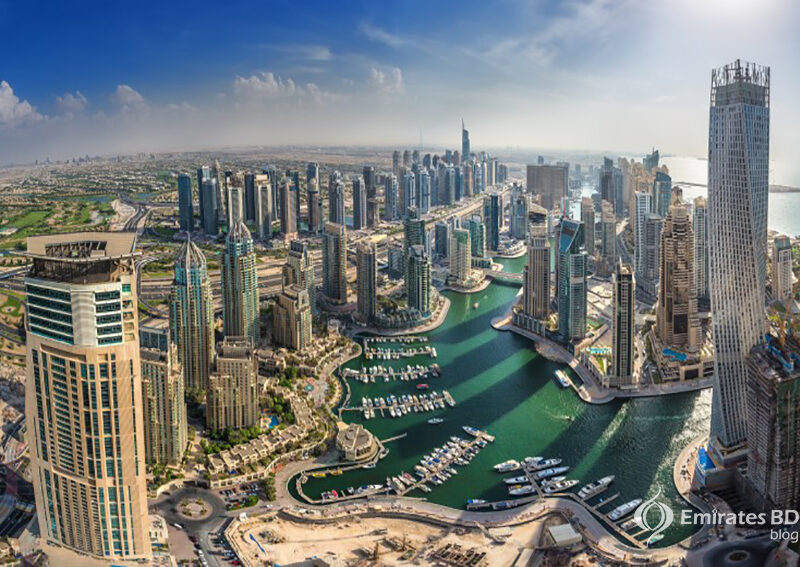Living in the United Arab Emirates (UAE) is an experience like no other. Home to a wide range of nationalities, a nightlife to rival London and New York, and absolutely zero income tax, the Gulf nation has plenty to offer.
There’s plenty to recommend about life in a land where the skies are almost always blue. Here are the five best reasons to start living in the UAE:
- It has a minister of state for happiness and wellbeing. No, seriously. The country aims to become one of the five happiest countries in the world, so why not hop on board the love train?
- The weather and beaches are amazing. If you love following a day of work by working on your tan, the UAE is perfect for you.
- In fact, everything is gorgeous, from the man-made islands off the coast of Dubai to the world’s tallest tower, Burj Khalifa. There’s plenty of natural beauty too, including the wonderfully named Empty Quarter (Rub’ al Khali), which is the largest continuous sand desert in the world. If you’ve ever wanted to see the sweeping sands of Disney’s Aladdin in real life, this is your chance.
- You’ll be in good company as an expat. While the UAE’s population is around 10 million, more than 88% of residents come from abroad (United Nations, 2018). This means a huge variety of exciting cultures and food, and better still, you won’t be alone – data from embassies shows that 120,000 people from the UK and 50,000 from the US live in the UAE.
- There are almost no taxes. In 2018, the government introduced VAT for the first time on most goods and services, at the low rate of 5% – but that’s it. No income tax. Everything you make is yours to keep.
However appealing these reasons may be, it must be noted that if you’re thinking of making the jump to this Gulf nation, you may be in for a shock. Homosexuality remains illegal in the UAE, while women may face grave challenges in light of the country’s attitudes towards abortion, rape, and domestic abuse.
If you are able to navigate this level of culture shock, and are able to secure a decent job, then you’ll be in a prime position to take advantage of what the UAE has to offer. Let us help you get the most out of your move with these top things to know.
– How do the individual emirates differ?
The UAE is comprised of seven emirates, which gained independence and formed the country in 1971 after the British military stopped protecting the region. If you’re moving for work, you’re probably heading to either Abu Dhabi – which includes the UAE’s capital, most of its population, and 87% of its land – or Dubai, the spectacular business hub of the country.
Abu Dhabi contains both the largest place of worship in the country, in the shape of the imposing Sheikh Zayed Mosque in Abu Dhabi City, and the UAE’s biggest economy. In 2018, the emirate’s gross domestic product (GDP) was £194 billion. That’s more than Portugal, Egypt, and Vietnam, according to the International Monetary Fund – and it’s just one emirate.
Meanwhile, Dubai’s GDP is £83 billion – and when you consider that fact alongside the emirate’s incredible skyline and man-made islands, you can start to understand why Dubai International Airport is the third-busiest in the world. According to National Geographic stats from 2018, an enormous 88 million passengers pass through its gates across the year.
– Don’t forget to check out the other emirates
While the urban hubs of Abu Dhabi and Dubai are endlessly enjoyable, the other emirates also have their unique charms, and are worth exploring – not least for their highly Instagrammable landscapes.
As well as Ajman, which is a mostly agricultural region, there’s Fujairah, an emirate with picturesque countryside and mountains that also boasts the Al Badiyah Mosque, built more than 650 years ago and still in use. And though you as a foreigner are banned from buying land or owning the majority of any business, you’re welcome to enjoy plenty of watersports, such as windsurfing, water skiing and diving.
You can also take a sea-and-sun-themed trip to Ras Al Khaimah, an emirate with 64km of beach coastline, as well as the longest zipline in the world at Jebel Jais – the UAE’s highest peak.
Take care if you visit Sharjah, where the law requires everyone to dress conservatively and bans drinking in public (and only privately if you have a licence). You’re also forbidden to socialise with members of another gender if you’re not married to them.
But if none of that bothers you, Sharjah has everything from a classic car museum to a palace and aquarium – and for those who are more interested in exploring nature, there’s a mangrove forest, a seaside promenade, and a beautiful bird of prey centre.
The UAE mixes Islamic history and culture with many western attractions, and nowhere is this clearer than Umm Al Quwain. The emirate contains a majestic 18th century fort and historic architecture, alongside a water park which covers 250,000m² and has a daily capacity of 10,000. Dreamland Aqua Park contains more than 30 rides, slides and attractions, and runs throughout the year.
– What is healthcare like in the UAE?
Hopefully your company will provide you with access to private treatment, which has a better reputation in the UAE than the public healthcare system. As of 2017, there were more private hospitals than public, according to Allianz.
This makes sense, since anyone who isn’t an Emirati national only has access to emergency treatments.
In the particular case of Dubai, unless you are an Emirati national, it is mandatory that you have some form of private medical cover.
-Make sure you can afford the move
Living in the UAE isn’t cheap. Stats gathered by Numbeo reveal that renting a three-bedroom flat in the centre of either Abu Dhabi or Dubai costs more than £2,000 a month, and even your everyday expenses like coffee or beer will set you back about £3.50 apiece.
If you’re from a big city like London or Los Angeles, then you’re prepared for these sort of prices. Just make sure, as ever, that your salary matches your lifestyle – a calculation which will be helped by the complete lack of income tax in the UAE.
– Living in the UAE is a cultural shift – but yes, you can still drink
The UAE could be your dream move, as long as you respect the rules. First off, remember that the weekend is on Friday and Saturday – with Sunday as the first day of the work week – because Friday is a holy day in Islam.
If you’re after some alcohol-fuelled fun when you clock off on Thursdays, go for it – just don’t discuss it at work, as there is still a stigma around drinking. There are plenty of bars and restaurants with drinks licenses, and most Dubai bars have happy hours. Women can also enjoy ladies’ night, usually on Tuesdays, while there are countless brunch options with unlimited food and drink.
Watch out if you’re used to life in the UK, though: the legal drinking age in the UAE is 21, and they check IDs. It’s also illegal to consume alcohol on the street, and there is a zero tolerance approach to consuming drugs, which can lead to deportation or imprisonment.
– In fact, get ready for many unexpected laws
Though you can find licensed bars, clubs and restaurants to drink in everywhere apart from Sharjah, watch out for other unusual restrictions. You could be thrown in prison for gossiping, swearing (both in real life and on WhatsApp), raising money for charity without a licence, carrying food with poppy seeds, or taking photos of people without their permission.
You can be deported for all of these offences, and may also be forced to leave the country – as well as facing a five-figure fine – if you take photos of road accidents.
Sex outside marriage is banned as well, meaning that you and your partner will have to tie the knot before moving to the UAE or risk spending a minimum of one year in prison.
-What’s life in the UAE like for foreign women?
While it’s generally safe to walk the streets, if you’re a woman in the UAE, that comes with conditions. There’s no need to wear a hijab, but make sure to cover your shoulders, knees and neckline if you’re at work or in a public space – unless that place is the beach.
Lonely Planet recommends that if you’re in the UAE with your boyfriend, you should say you’re married, and avoid public displays of affection – these can even be punished with 80 lashes. On public buses, sit near the front in the women’s section, and try not to make direct eye contact with men you don’t know.
Also be aware that women have often faced denial or even imprisonment after accusing men of rape or domestic abuse. Abortion is also illegal in the UAE, unless the person giving birth or their baby is in mortal danger. It can lead to a year in prison.
Apart from these restrictions, living in Abu Dhabi as a woman – or almost any other emirate, for that matter – is much the same as life in the west. You can drive, you can drink, and you can move around the country alone without much trouble.







